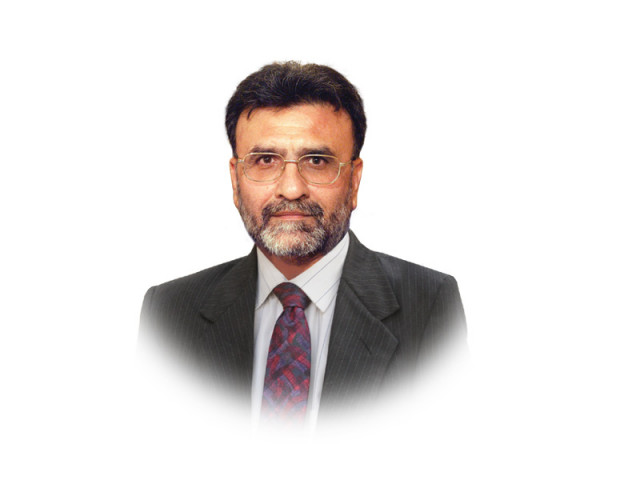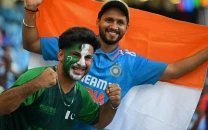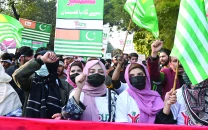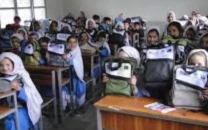Knower of Byzantine intrigues peddles strange logic
In no session of Committee on National Security the election scene of India was ever discussed somewhat seriously.

The stupid me presumed that this veteran of the religious-right, who also fathoms Byzantine intrigues, almost instinctively, might enlighten us about insidious whispers that continue vending the stories of doom and gloom regarding the fate of the Nawaz government.
The first point, no doubt, with which the Maulana started his speech, deserved serious consideration. He claimed that for the past many weeks whole of North Waziristan appeared gloomy, besieged and almost deserted due to the continuous and punitive-looking curfew. The law enforcers, the JUI-F leader conceded with an open heart, might have enforced this curfew to check the mobility of deadly militants. Yet an overwhelming majority of North Waziristanis had begun feeling as if the state of Pakistan was making them the target of “collective punishment.” The Prime Minister must act SOS to offset a growing feeling of alienation amongst the hapless residents of North Waziristan due to the same curfew.
I have no means and hard information to judge Maulana’s claim on North Waziristan. But he did make me edgy by seriously spinning the story that powerful forces that work overtime to malign Islam and Pakistan were exaggerating the impact of polio in this country. The objective is to project Pakistanis as the main carriers of the poliovirus. “They want to make us pariahs of this world,” thundered Maulana, before blaming the foreign office babus for failing in protecting and promoting the good image of Pakistan.
I never expect this from a leader too exposed to all nuances of diplomacy. After all, he had remained a hyperactive Chairman of the National Assembly Committee on Foreign Affairs throughout the second Benazir government. Since 2008, he also has been heading a high-profile parliamentary committee on Kashmir.
He certainly needs no tutor for discovering that no diplomat can project the good image of Pakistan, if polio workers keep getting target-killed in our country. Most of our religious leaders, especially those coming from the school of which Maulana Fazlur Rehman is considered an icon, continue to hawk fears in their sermons that polio drops carried ‘haram ingredients’, which harm virility of Muslim males besides turning them infertile.
Only the other day, Maulana Jamaluddin Gauhar, a member of the national assembly from South Waziristan, had already made an audacious claim that the US was spreading the poliovirus through drones all across the tribal belt of Pakistan. Gauhar hails from the JUI-F. Maulana Fazlur Rehman must revisit Gauhar’s speech before educating us about how even a Pakistani diplomat of Kissinger’s caliber can persuade the world to take us seriously when it comes to dealing with polio. Fazl’s strange position on polio rather made me realize that we need no enemies for turning ourselves into pariahs of the world. All through the two weeks of the eleventh national assembly session, India had been going through the ropes of a very important election in that country’s history. Not for once, I heard any of our “public representatives” talking about these elections within or outside the house. Their attention rather remained obsessively hooked to find more and more regarding games that presumably are being played through alleged ‘proxies’ of the elected government and powerful elements of the deep state, both in the media and real-time politics.
I tried many times to seek assessment and opinions of some ministers and prominent legislators, known for being well-clued to matters of national security and our relations with other countries, in the specific context of Indian elections. None of them seemed interested. When pressed to imagine the possible scenarios in case of Modi’s victory, most of them would just shrug shoulders before assuring me that the delicate combination of domestic and international compulsions would force Narender Modi to eventually take the road Vajpayee had travelled on to seek long term peace with Pakistan. And they would not want to continue with discussion, if I dared suggesting that a hardcore Hindu in Modi might act differently.
To the best of my knowledge, in no session of the Committee on National Security the election scene of India was ever discussed somewhat seriously. Modi wave has finally swept India on Friday. Yet on the same day, we kept listening to foolish tales in proceedings of an august house, which never stops pretending as more “sovereign” than the rest of our state institutions put together.
Published in The Express Tribune, May 17th, 2014.



















COMMENTS
Comments are moderated and generally will be posted if they are on-topic and not abusive.
For more information, please see our Comments FAQ